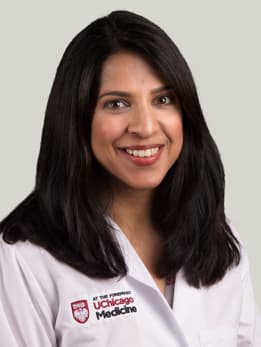Teaching healthcare workers how to combat medical misinformation

A new University of Chicago accelerated course is helping students combat medical misinformation thanks to a $35,000 grant from the Association of American Medical Colleges’ (AAMC) Kickstarting Strategies for Addressing Health Misinformation initiative. The virtual course — open to advanced medical, pharmacy and nursing students — was held for the first time in August.
“Students walk out of this course with very specific, concrete tools that are directly applicable to their careers and promoting public health,” said Sara Serritella, Institute for Translational Medicine Director of Communications. She teaches the course alongside Dean for Medical Education Vineet Arora, MD, MAPP, and other faculty experts. “These skills literally can save lives.”
False information spreads wider and faster than facts, according to MIT research. More than 72 percent of the public uses some type of social media. When rumors run rampant during a global health crisis like the COVID-19 pandemic, it sets the stage for people to unintentionally follow bad information, Arora said.
“Misinformation is unfortunately like a cancer that spreads out of control very quickly when left unchecked,” said Arora, spearheading a new science communications curriculum with Serritella. “Our healthcare team members need formal training on how best to debunk medical myths, just like they need training on how best to diagnose and treat disease.”
The course focuses on the healthcare professional-patient relationship. Each session includes a lecture and workshop during which students identify a medical myth from their community and work together on what and how to communicate with diverse patient groups.
Techniques on how healthcare professionals can correct misinformation while staying approachable – and without judging patients – are shared. Participants also create social media-friendly educational infographics relying on techniques used to explain climate science, but adapted for clinical settings.
The AAMC’s goal in offering the grants is to develop competency-based, interprofessional strategies to fight health misinformation and integrate them into new or existing curricula. The UChicago Medicine team is condensing an existing 12-week, first-year medical student class taught by Arora and Serritella on how to tackle health misinformation using empirically driven methods and offering it to a broader student group.
“Doctors, pharmacists and nurses all engage with patients and the community in different settings and at different points of the health care spectrum,” said Aashna Sunderrajan, PhD, a research manager in General Medicine who leads Arora’s research team. “We thought this would be a good idea to bring them together to tackle misinformation in their communities.”
Medical myths continue to be a patient issue that nurses struggle with, said nursing research manager Nicole Bohr, PhD, RN.
“With the rise of social media, medical misinformation definitely seems to have gotten worse,” said Bohr. “Algorithms are putting things in front of people that are not accurate, don’t provide references and don’t say who's funding the content.”
The course organizers plan to offer an elective medical misinformation course tailored to pharmacy and nursing students next summer or fall, but this will depend on funding. In the meantime, they’ll collaborate with other institutions that received the AAMC grant on a white paper about the effectiveness of the initiative.
The “Training Interprofessional Teams to Improve Scientific Communication and Address Health Misinformation in Diverse Communities” course will be recorded for on-demand viewing. For more information on training in science communication at the University of Chicago Pritzker School of Medicine, click here.

Vineet Arora, MD
Vineet Arora, MD, MAPP, specializes in improving the learning environment for medical trainees and the quality, safety and experience of care delivered to hospitalized adults. She serves as Dean for Medical Education at the Pritzker School of Medicine.
See Dr. Arora's profile